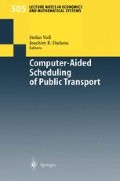Abstract
Airlines’ and railways’ expensive resources, especially crews and aircraft or trains are to be optimally scheduled to cover flights or trips of timetables. Aircraft and trains require regular servicing. They are to be routed as to regularly pass through one of the few maintenance bases, e.g., every three to four operation days for inspection. Apart from complicating workrules, crews are to be scheduled so as to “pass through” their home bases weekly for a two-day rest. This analogy is utilized in order to recognize opportunities for integrating classical planning processes for crew scheduling, and to transfer solution methodologies. A mixed-integer flow model based on a state-expanded aggregated time-space network is developed. This mathematical model, used to solve large-scale maintenance routing problems for German Rail’s intercity trains, is extended to the airline crew scheduling problem where maintenance states are replaced by crew states. The resulting network flow approach to an integrated crew scheduling process involving multiple crew domiciles and various crew requests is tested with problems from a European airline. A decision support system and computational results are presented.
Access this chapter
Tax calculation will be finalised at checkout
Purchases are for personal use only
Preview
Unable to display preview. Download preview PDF.
Bibliography
Bodin, L. and B. Golden (1981). Classification in vehicle routing and scheduling. Networks 11, 97–108.
Borndörfer, R. (1998). Aspects of Set Packing, Partitioning, and Covering. Shaker, Aachen. PhD thesis.
Carl, G. and T. Gesing (2000). Flugplanung als Instrument des Informationsmanagements zur Ressourcenplanung und-Steuerung einer Linienfluggesellschaft. In J.R. Daduna and S. Voß (Eds.), Informationsmanagement im Verkehr, Physica, Heidelberg, 167–198.
Darby-Dowman, K. and G. Mitra (1985). An extension of set partitioning with application to crew scheduling. European Journal of Operational Research 72, 312–322.
Desrosiers, J., Y. Dumas, M.M. Solomon, and F. Soumis (1995). Time constrained routing and scheduling. In M.O. Ball, T.L. Magnanti, C.L. Monma, and G.L. Nemhauser (Eds.), Network Routing, Handbooks in Operations Research and Management Science, 8, Elsevier, Amsterdam, 35–139.
El-Darzi, E. and G. Mitra (1992). Solution of set-covering and set-partitioning problems using assignment relaxations. Journal of the Operational Research Society 43, 483–493.
El-Darzi, E. and G. Mitra (1995). Graph theoretic relaxations of set covering and set partitioning problems. European Journal of Operational Research 87, 109–121.
Feo, T.A. and J.F. Bard (1989). Flight scheduling and maintenance base planning. Management Science 35, 1415–1432.
Garfinkel, R.S. and G.L. Nemhauser (1969). Set partitioning problem: Set covering with equality constraints. Operations Research 17, 848–856.
Hoffman, K.L. and M.W. Padberg (1993). Solving airline crew scheduling problems by branch-and-cut. Management Science 39, 657–682.
Lavoie, S., M. Minoux, and E. Odier (1988). A new approach to crew pairing problems by colomn generation with application to air transportation. European Journal of Operational Research 35, 45–58.
Löbel, A. (1998). Optimal Vehicle Scheduling in Public Transit. Shaker, Aachen. PhD thesis.
Mellouli, T. (1998). Periodic maintenance routing of German rail’s intercity trains by a flow model based on a state-expanded aggregated time-space network. In 6th Meeting of the EURO WG on Transportation, Gothenburg, Sweden, September 9–11, 1998. To appear in Transportation Research.
Suhl, L. (1995). Computer-Aided Scheduling: An Airline Perspective. Deutscher Universitäts-Verlag, Wiesbaden.
Suhl, L. and T. Mellouli (1999). Requirements for, and design of, an operations control system for railways. In N.H.M. Wilson (Ed.), Computer-Aided Transit Scheduling, Lecture Notes in Economics and Mathematical Systems, 471, Springer, Berlin, 371–390.
Suhl, U. (1994). MOPS: A mathematical optimization system. European Journal of Operational Research 72, 312–322.
Author information
Authors and Affiliations
Editor information
Editors and Affiliations
Rights and permissions
Copyright information
© 2001 Springer-Verlag Berlin Heidelberg
About this chapter
Cite this chapter
Mellouli, T. (2001). A Network Flow Approach to Crew Scheduling Based on an Analogy to an Aircraft/Train Maintenance Routing Problem. In: Voß, S., Daduna, J.R. (eds) Computer-Aided Scheduling of Public Transport. Lecture Notes in Economics and Mathematical Systems, vol 505. Springer, Berlin, Heidelberg. https://doi.org/10.1007/978-3-642-56423-9_6
Download citation
DOI: https://doi.org/10.1007/978-3-642-56423-9_6
Publisher Name: Springer, Berlin, Heidelberg
Print ISBN: 978-3-540-42243-3
Online ISBN: 978-3-642-56423-9
eBook Packages: Springer Book Archive

